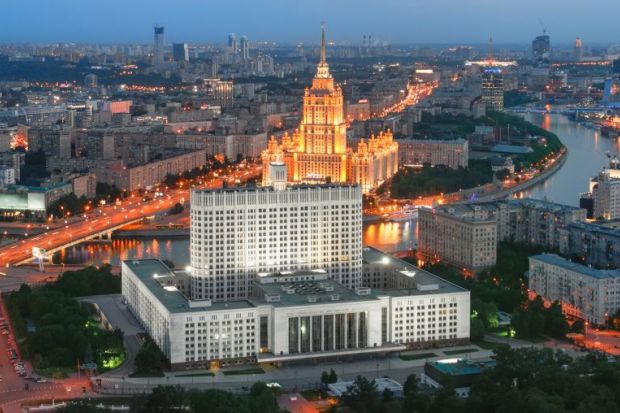Hearing the sound of explosions overhead while taking refuge in a bomb shelter is now a daily reality for Ukrainians. Some of us writing this article do so from one of these cold underground spaces; intense rocket fire in Kharkiv recently meant that we could not go outside for a week.
The lives of thousands of academics in Ukraine, and millions more men, women and children, have been turned upside down. Worse still, at least 2,421 civilians have been killed or seriously injured, as of 21 March, according to official United Nations figures. The UN’s high commissioner suggests that the actual death toll is far, far higher.
It is now just over a month since the people of Ukraine were woken on 24 February by explosions caused by rocket attacks carried out by the Russian army on most of the country’s major cities. Occupying troops have since used weapons banned by the UN against not only military facilities but also civilians. Vladimir Putin’s threats to use nuclear weapons, and the seizures of nuclear power plants in Chernobyl and Zaporizhzhia, could escalate Russia’s war in Ukraine into a Third World War.
Amid this chaos, the actions of Western universities and academics – including sanctions on Russian higher education and research – may seem insignificant. They are not.
In this war, Russian universities are a weapon of the state – they pose a danger both inside and outside the country by spreading toxic propaganda messages. They are part of an apparatus that means that almost 90 per cent of Russians support not only war in Ukraine, but also the invasion of other European countries.
Last month, the Russian Union of Rectors, which represents more than 700 university rectors and presidents, and the Russian Academy of Sciences Presidium joined individual academics, including those from Saint Petersburg State University, and students of Moscow State Institute of International Relations, in backing the war. The reputations of these institutions and individuals will forever be stained by this failure as public intellectuals and public platforms to defend the universal values of democracy, peace and academic integrity.
International outrage and support for punitive sanctions on Russian science is growing, however. More than 8,000 scientists and educators – among them three Nobel prizewinners and many internationally respected scientists – have signed a letter backing further action.
We would urge you to do the same here. The goals of the appeal are:
- to block access to all scientometric databases and materials of scientific publishers for citizens and institutions of the Russian Federation and Belarus
- to make it impossible for researchers affiliated with institutions of the Russian Federation and Belarus to participate in international grant programmes funded by the European Union and other partners
- to suspend the participation of researchers, students and institutions from the Russian Federation and Belarus from current international academic mobility programmes
- to boycott attempts at holding scientific events in Russia and Belarus, in particular, scientific conferences and symposiums
- to suspend indexing of scientific materials published in the Russian Federation and Belarus in all scientometric databases
- to prohibit citizens of the Russian Federation and Belarus from being editors/co-editors/reviewers of international publications.
The implementation of these sanctions should not stop individual scientists making their ethical choices against Russia’s war in Ukraine. At the same time, we believe that only public condemnation of the Russian war in Ukraine and of the Kremlin regime can help to stop the bloodshed.
That said, it is wrong to pretend that Russians who publicly condemn Putin’s regime face anywhere near the dangers that Ukrainian academics now encounter daily; they should not be united in one basket. While Russians and Belarusians face domestic repression, Ukrainians are fleeing shelling, bombing, killing and complete destruction of their homes and cities; victims of aggression should be prioritised.
Many countries have already supported the imposition of sanctions against Russia’s scientific and educational institutions. Nevertheless, some publishers and private foundations still remain neutral when talking about the openness of science. However, neutrality is inapplicable in this situation. Russia’s unjustifiable military invasion of Ukraine is unprecedented; it requires unprecedented reactions from the world scientific community. During three weeks of war in Ukraine, 518 educational institutions were damaged and 72 were completely destroyed. Academic ties between the world community and scientists in Russian institutions cannot continue as long as the Russian offensive against Ukraine continues.
Science matters in this struggle. There is little doubt that the Kremlin is threatening to use high technology – namely, nuclear, biological and chemical weapons – in Ukraine. This is confirmed by the capture and occupation of the Chernobyl and Zaporizhzhia nuclear power plants and by the shelling of the nuclear installation of the National Scientific Center “Kharkiv Physics and Technology University”. At the same time, Rosatom, the Russian State Nuclear Energy Corporation, announced the appropriation of the Zaporizhzhia nuclear power plant and the importation of Russian scientists and engineers to its territory, which is a security threat to the whole world.
This is an unprecedented use of intellectual and scientific potential against the civilian population in Ukraine and throughout Europe. The International Atomic Energy Agency speaks of an extremely dangerous situation in Ukraine related to the radiation background and the occupation of nuclear facilities by Russia.
The goal of the sanctions we propose is not to punish people who speak out against the military aggression of the Russian Federation but rather to stop the complicity of the Russian academic community in crimes against humanity, and to cut off ties for the period of military invasion. Our message is clear: stay with Ukraine and support our petition.
Dmytro Chumachenko is an associate professor at the National Aerospace University “KhAI” in Kharkiv; Oksana Bilous is associate professor at the National Agency for Higher Education Quality Assurance in Kyiv; Dmytro Sherengovsky is vice-rector for academic and internationalisation at the Ukrainian Catholic University, Lviv; and Kateryna Zarembo is associate fellow at the New Europe Center, and senior lecturer, National University of Kyiv-Mohyla Academy, in Kyiv.
Register to continue
Why register?
- Registration is free and only takes a moment
- Once registered, you can read 3 articles a month
- Sign up for our newsletter
Subscribe
Or subscribe for unlimited access to:
- Unlimited access to news, views, insights & reviews
- Digital editions
- Digital access to THE’s university and college rankings analysis
Already registered or a current subscriber? Login







